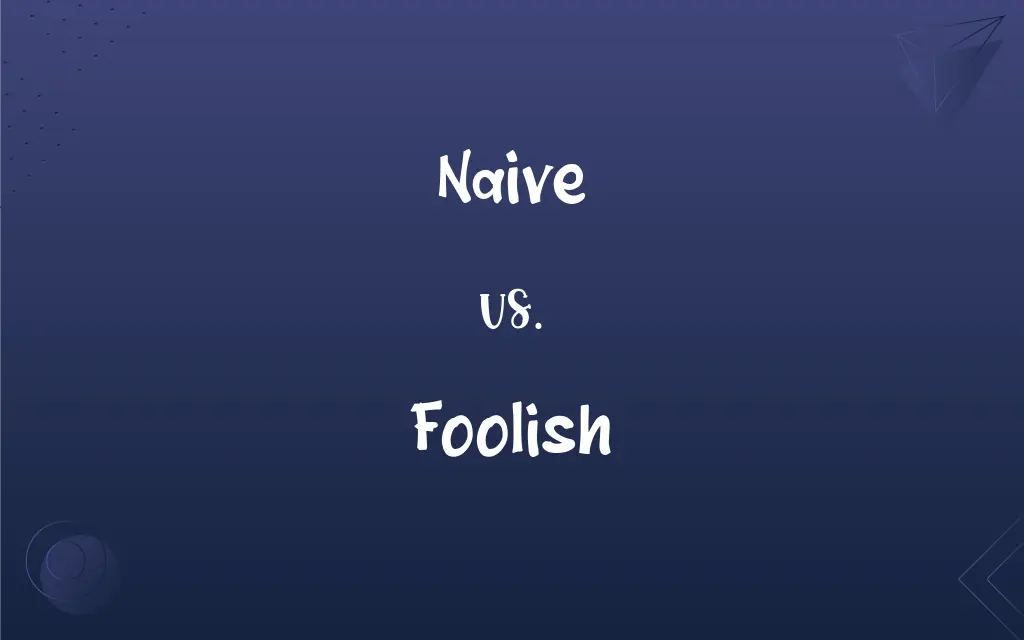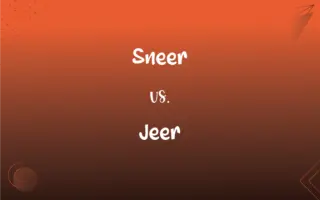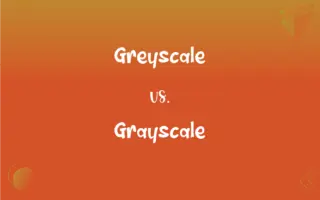Naive vs. Foolish: What's the Difference?
By Aimie Carlson & Harlon Moss || Updated on May 22, 2024
Naive describes a lack of experience or sophistication, while foolish refers to a lack of good sense or judgment.

Key Differences
Naive indicates a person who is innocent or inexperienced, often due to lack of exposure or understanding. This term implies simplicity and unawareness of complex realities. Foolish, on the other hand, suggests a lack of common sense or sound judgment, often resulting in unwise decisions. A foolish person might repeatedly make the same mistake despite knowing better or ignore clear signs of danger or consequence.
While naivety is often associated with youth or sheltered upbringing, it doesn't necessarily imply stupidity. Naive people might learn and gain wisdom with experience. In contrast, foolishness often suggests a disregard for learning from experience, leading to repeated poor choices.
Naive individuals might be overly trusting or optimistic, while foolish individuals might engage in reckless or ill-considered actions. Both traits can lead to negative outcomes, but the motivations differ naivety stems from innocence, while foolishness stems from imprudence.
Naive behavior can sometimes be endearing or sympathetic, as it reflects a pure-hearted outlook. Foolish behavior, however, is generally seen as negative, as it denotes a lack of critical thinking and awareness.
In social contexts, naivety might be excused or gently corrected, whereas foolishness often attracts criticism or ridicule. Understanding these distinctions helps in addressing the root causes of such behaviors effectively.
ADVERTISEMENT
Comparison Chart
Definition
Lacking experience or sophistication
Lacking good sense or judgment
Connotation
Often innocent and inexperienced
Often imprudent and senseless
Basis
Unawareness due to inexperience
Ignorance despite experience
Common Behavior
Overly trusting, optimistic
Reckless, ill-considered actions
Social Perception
Can be endearing or sympathetic
Generally negative and criticized
ADVERTISEMENT
Naive and Foolish Definitions
Naive
Lacking experience or sophistication.
She was naive about the complexities of the business world.
Foolish
Resulting from poor decision-making.
Her foolish investment lost all her savings.
Naive
Unaffected by worldly experience.
Despite her age, she remained somewhat naive in social matters.
Foolish
Reckless or imprudent.
The foolish prank endangered everyone's safety.
Naive
Innocently unaware of complex realities.
His naive belief that everyone is honest got him into trouble.
Foolish
Lacking good sense or judgment.
It was foolish to go hiking without proper gear.
Naive
Exhibiting simplicity or ingenuousness.
The child's naive questions were charming.
Foolish
Unwise despite knowing better.
Continuing to smoke despite health warnings is foolish.
Naive
Overly trusting due to lack of exposure.
His naive trust in strangers often led to disappointment.
Foolish
Susceptible to making repeated mistakes.
He was foolish enough to believe the scam twice.
Naive
Simple and guileless; artless
A child with a naive charm.
Foolish
Lacking or exhibiting a lack of good sense or judgment; silly
A foolish boy.
A foolish purchase.
Naive
Unsuspecting or credulous
Naive victims of the scam.
Foolish
Capable of arousing laughter; absurd or ridiculous
A foolish grin.
Naive
Showing or characterized by a lack of sophistication and critical judgment
"this extravagance of metaphors, with its naive bombast" (H.L. Mencken).
Foolish
Embarrassed; abashed
I feel foolish telling you this.
Naive
Not previously subjected to experiments
Testing naive mice.
Foolish
Insignificant; trivial
Foolish little knickknacks.
Naive
Not having previously taken or received a particular drug
Patients naive to antipsychotic medication.
Foolish
(of a person, an action, etc.) Lacking good sense or judgement; unwise.
Naive
One who is artless, credulous, or uncritical.
Foolish
Resembling or characteristic of a fool.
Naive
Lacking worldly experience, wisdom, or judgement; unsophisticated.
Foolish
Marked with, or exhibiting, folly; void of understanding; weak in intellect; without judgment or discretion; silly; unwise.
I am a very foolish fond old man.
Naive
Not having been exposed to something.
Foolish
Such as a fool would do; proceeding from weakness of mind or silliness; exhibiting a want of judgment or discretion; as, a foolish act.
Naive
(of art) Produced in a simple, childlike style, deliberately rejecting sophisticated techniques.
Foolish
Absurd; ridiculous; despicable; contemptible.
A foolish figure he must make.
Naive
Intuitive; designed to follow the way ordinary people approach a problem.
Foolish
Devoid of good sense or judgment;
Foolish remarks
A foolish decision
Naive
A naive person; a greenhorn.
Foolish
Having or revealing stupidity;
Ridiculous anserine behavior
A dopey answer
A dopey kid
Some fool idea about rewriting authors' books
Naive
Having native or unaffected simplicity; ingenuous; artless; frank; as, naïve manners; a naïve person; naïve and unsophisticated remarks.
Naive
Having a lack of knowledge, judgment, or experience; especially, lacking sophistication in judging the motives of others; credulous; as, a naive belief in the honesty of politicians.
Naive
Marked by or showing unaffected simplicity and lack of guile or worldly experience;
A teenager's naive ignorance of life
The naive assumption that things can only get better
This naive simple creature with wide friendly eyes so eager to believe appearances
Naive
Lacking experience of life;
A callow youth of seventeen
Naive
Lacking sophistication
FAQs
What does naive mean?
Naive means lacking experience or sophistication.
Can someone be both naive and foolish?
Yes, a person can be both naive and foolish, showing innocence and poor judgment.
Does being naive imply stupidity?
No, being naive implies a lack of experience, not intelligence.
Is naivety always a bad trait?
No, naivety can sometimes be endearing and reflects a pure-hearted outlook.
Why is foolishness often criticized?
Foolishness is criticized because it reflects poor decision-making and a lack of prudence.
Are naive people more trusting?
Yes, naive people tend to be overly trusting due to their inexperience.
How is foolish different from naive?
Foolish refers to a lack of good sense or judgment, while naive implies innocence or inexperience.
Can naivety be corrected?
Yes, naivety can be addressed through experience and learning.
What causes foolish behavior?
Foolish behavior stems from a lack of good sense or ignoring good judgment.
Can foolish actions be dangerous?
Yes, foolish actions can be reckless and endanger oneself or others.
Do naive people learn quickly?
They can learn quickly once exposed to new experiences and realities.
Is naivety more common in younger people?
Yes, naivety is often associated with youth and lack of exposure.
Why might someone be naive?
Someone might be naive due to a sheltered upbringing or limited exposure to complex situations.
Is being naive considered endearing?
Sometimes, as it reflects innocence and purity.
What are the consequences of foolish behavior?
Foolish behavior can lead to negative outcomes and poor decisions.
Can a foolish person learn from their mistakes?
Yes, but foolishness often involves repeating mistakes despite knowing better.
How do social perceptions differ for naive and foolish?
Naivety can be seen as innocent, while foolishness is usually viewed negatively.
Can a person outgrow being naive?
Yes, gaining experience can reduce naivety.
How can naivety affect relationships?
Naivety can lead to unrealistic expectations and misunderstandings in relationships.
How can foolishness be addressed?
Foolishness can be addressed by encouraging better judgment and decision-making skills.
About Author
Written by
Aimie CarlsonAimie Carlson, holding a master's degree in English literature, is a fervent English language enthusiast. She lends her writing talents to Difference Wiki, a prominent website that specializes in comparisons, offering readers insightful analyses that both captivate and inform.
Co-written by
Harlon MossHarlon is a seasoned quality moderator and accomplished content writer for Difference Wiki. An alumnus of the prestigious University of California, he earned his degree in Computer Science. Leveraging his academic background, Harlon brings a meticulous and informed perspective to his work, ensuring content accuracy and excellence.































































